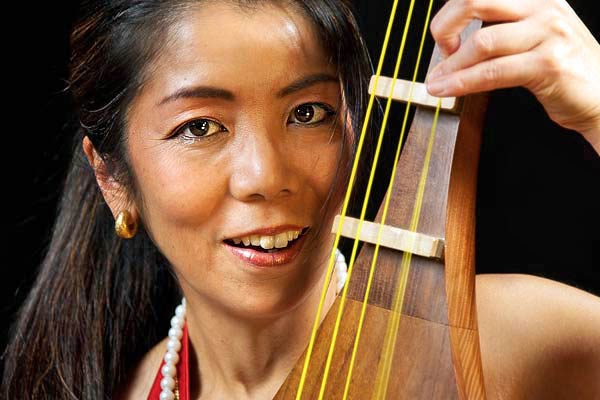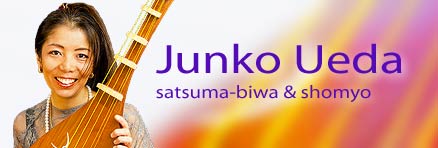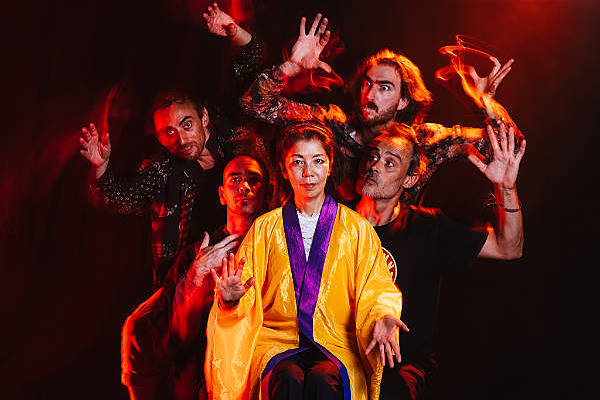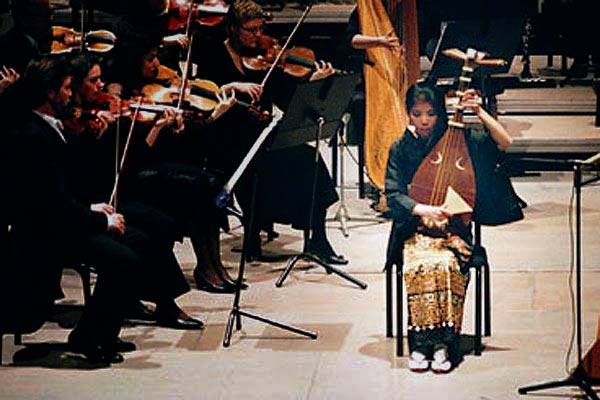Junko Ueda
Junko Ueda (nacida en Tokio, Japón) es cantante japonesa e intérprete de satsuma-biwa (laúd japonés), especialista en música de biwa-canto tradicional japonés (puro estilo de los trovadores japoneses) y canto budista shomyo. También está especializado para interpretar las piezas para biwa/voz por compositor japonés Tôru Takemitsu. Ueda estudió satsuma-biwa y canto con la famosa Kinshi Tsuruta (Satsuma-Biwa estilo Tsuruta) y canto budista shomyo con Koshin Ebihara (escuela Tendai). Estudió piano y composición (con Reiko Arima, Jôji Yuasa) en el Tokyo College of Music.
Desde 1988, Ueda se establece en Europa (Amsterdam/Holanda y Granada/España) y Japón, y ha estado presentando sus biwa conciertos y talleres de canto shomyo en numerosas situaciones y en los festivales de música de todo el mundo. Sus CDs biwa tradicionales L’épopée des Heike (CD650 VDE / AIMP Ginebra) y Satsuma Biwa (ARN64577 Arion, París / Ethnomad, Ginebra), han recibido varios premios, por ejemplo, el Grand Prix du Disque, Académie Charles Cros, París y Choc Le Monde de la Musique, en París. Ha publicado sus CDs en solitario de cantos budistas shomyo, Meditative Flowers y Kujô-Shakujô (E-records, Granada, España).
Desde 1995, Ueda ha estado presentando el taller de canto budista shomyo. En este taller, los participantes disfrutan cantando las melodías antiguas de shomyo que tiene 1200 años y buscan la sabiduría y el poder de la respiración a través de esta tradición antigua.
Contribuyendo para nuevas composiciones y la improvisación, Junko Ueda ha estado trabajando con los compositores, por ejemplo, Jean-Claude Eloy, Akemi Naito, Keiko Harada y los músicos como violonchelista Yo-Yo Ma, viola da gamba Jordi Savall, el contrabajista Peter Kowald, el holandés Nieuw Ensemble, percussionists Ying-Hsueh Chen y Lê Quan Ninh. También interpreta las piezas para biwa del compositor japonés Tôru Takemitsu, como November Steps y Voyage. Desde 1988 ha estado presentando una actuación de dúo con el flautista holandés Wil Offermans. Este Dúo Ueda Offermans ha grabado el CD "How to Survive in Paradise" (CD732 VDE-Gallo de Suiza) y ha estado de gira por todo el mundo (Europa, Asia, América del Norte y del Sur), interpretando composiciones propias e improvisaciones. Ha trabajado activamente como productora para varios proyectos interculturales como 12xHolland. Desde 2021, está actuando junto con el grupo francés de rock progresivo ‘PoiL’. Este proyecto se llama ‘PoiL Ueda’, realiza numerosas giras por toda Europa y ha lanzado el álbum (CD/LP) PoiL Ueda (Dur et Doux, Francia) en 2023.
Video Destacado
Grabación en vivo de un arreglo de Heike Monogatari por el Dúo Ueda Offermans en el Copis Miyoshi Concert Hall, Saitama, Japón. Incluye las piezas tradicionales Dan-no-Ura y Gion-shoja. Versión completa (26 min).
• Ver más videos en el Galeria de Videos.
Revista de Prensa
- Junko Ueda, un maestra en silencio musical ... una belleza musical, que no se conoce en Europa...
(West Deutsche Zeitung, Alemania) - Una voz, llena de misterio y solemnidad, sin embargo, la sensualidad ... ella interpretó su instrumento con una precisión asombrosa y variedad...
(Le Monde, Francia) - Que belleza impresionante ... su público se encuentran atrapados dentro de los dos segundos...
(De Volkskrant, Holland)
Algunas reflexiones sobre…
Performing satsuma-biwa music: A challenge for sharing an emotion, which is evoked when you touch the significant dignity facing to the deepness which has been continuously developed through the tradition. My biwa teacher, Ms. Kinshi Tsuruta was convinced that everywhere in the world, the biwa story-telling music can be understood. One of the most important elements of the story-telling is the sound of the voice and the breath which contain human’s thoughts, feeling and deep sense. The most impressive element is not the meaning of the words, but the sound of the voice and the timing 'MA' of the breath.
Singing shomyo: The human being is a child created from the stars wandering in the universal space. Then, now, by the action of singing, the small energy of voice or a vibration wave of the sound goes to the air. The wave continues traveling in the universal space. A little energy of the voice goes back to the universe where once human was created. A little energies of the voice are piled up in the universe and again continue wandering in the space like stars. If the imagining the universe is the existence of the universe itself, I imagine that my voice continue to wander in the space as an evident energy of the existence of the universe.
Playing the Biwa: One of the most characteristic effects of the biwa sound is "sawari" effect. "Sawari" means "to touch". Through touching, it creates mixture, distortion, waves and finally a complex noise which may consider as a "beautiful noise”. The sawari sound seems to symbolize the aspects of the nature or the universe.
Playing Music: A voyage towards something universal. An admiration towards something meditative. And through the act of music, a challenge towards healthy and peaceful world and common feelings to share with the people. Music is an essential food for the heart of the people.

Festivales de Música
- International Festival Musique Actuelle, Victoriaville, Canada
- Festival Détours de Babel, Grenoble, France
- April Jazz, Espoo, Finland
- Rudolstadt Festival, Rudolstadt, Germany
- Womex, Lisbon , Portugal
- VinterJazz, Copenhagen, Denmark
- Romanischer Sommer Köln, Germany
- International Sacred Music Festival of Bogota, Colombia
- Festival des Musiques Sacrées du Munde,’Sacrées Journées de Strasbourg’, France
- 19th Festival de l'Imaginaire, Maison des Cultures du Monde, Paris, France
- Copenhagen World Music Festival, Denmark
- Festival Electr()cution, Brest, France
- Academie Internationale d'Ete de Nice, France
- Mantica Theatre Festival, Cesena, Italy
- 17e Rencontres Internationales de Musique Médiévale du Thoronet, France
- Festival Trob'Art, Troubadours du Monde, St. Michel de Grandmond, France
- 8ème Festival International du Luth, Tétouan, Morocco
- Festival Ethnomad, Geneva, Swiss
- Voice Expeditions, Amsterdam, Holland
- Festival Suoni dal Mondo, Bologna, Italy
- Traditional and Sacred Music Heritage of Humanity, Yerevan, Armenia
- Lute Festival, Rasa Utrecht, Holland
- Singapore Festival of Arts, Singapore
- New Music Festival, Middelburg, Holland
- Musica Contemporanea, Bogota, Colombia
- Musique Action, Nancy, France
- Festival d'été de Québec, Canada
- Why Note, Dijon, France
- Sigma de Bordeaux, France
- Musica Strasbourg, France
- Warsaw Autumn, Poland
- Festival d'Autumn, Paris, France
- Oude Muziek Festival, Utrecht, Holland
- Wratislavia Cantans, Wroclaw, Poland
- Festival 38e Rugissants, Grenoble, France
- Inventionen, Berliner Festival Neuer Musik, Germany
- ISCM, World Music Days, Zurich, Swiss
- Rheinisches Musikfest, Köln, Germany
- Gaudeamus International Composers' Workshop, Amsterdam, Holland
- Midem, Cannes, France
Announcement


















